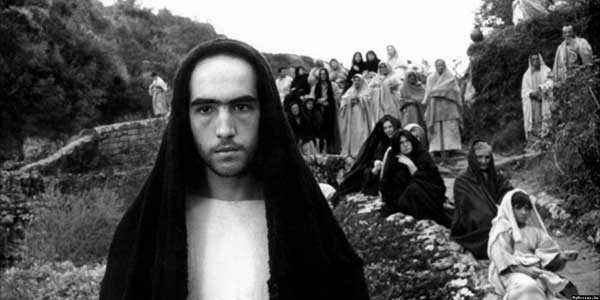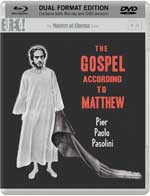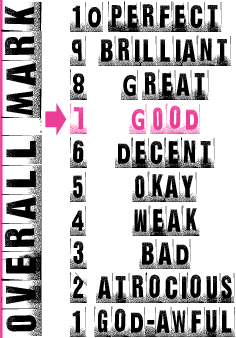
Director: Pier Paolo Pasolini
Running Time: 137 mins
Certificate: U
Release Date: March 26th, 2012

It’s rather odd that one of the most acclaimed religious films ever was made by Pier Paolo Pasolini, an affirmed atheist who was also responsible some of the most controversial movies ever, such as Salo Or The 120 Days Days Of Sodom. The Gospel According To St. Matthew came about 10 years before Salo, but still shows a unique filmmaker not afraid to let his voice be known.
The film is one of the few biblical movies that the Vatican has given its seal of approval, largely because it’s rather beautiful, poetic and sticks very close to the text of the book it’s based on, with most of the dialogue taken directly from the Bible. However Pasolini concentrates on the political side of Jesus, with Christ coming across a very intense, single-minded, rather humourless figure, whose ideas come across as surprisingly Marxist.
Played by Enrique Irazoqui (and his incredible monobrow), Jesus isn’t portrayed as a nice, friendly kind of guy you could have a drink and a laugh with. Indeed you have to wonder if Pasolini chose Irazoqui (a non-professional cast after he wrote his thesis on one of the director’s novels) based on the fact he looks a little like Che Guevera and can really pull off the intense, ideological single-mindedness of a revolutionary. It was this revolutionary side of Jesus that Pasolini was interested in and he certainly brings that out, while not forgetting the mystical and strange parts of the tale or the moments that are very human or indeed verge on the absurd.
Intensely poetic and with a very good if unexpected score – which ranges from classical music to a Congolese mass to bluegrass songs – The Gospel According To St. Matthew’s real strength is to allow you to get lost in your own thoughts as it washes over you. The film gives the viewer space to interpret, think and cogitate. The religious viewer is likely to find it transcendent, while atheists are given space to consider the questions Christ’s story raises, and it will certainly give anyone pause to think about quite what a political figures Jesus was, which often gets overlooked. After all, while the church tends to say he died for our sins, he was killed because of his politics.
This is the first Blu-ray release the movie has had anywhere in the world. 48-year-old Italian black & white movies aren’t the usual sort of films that get HD makeovers, so how does it scrub up? While there are inevitable issues with grain, the picture quality is largely very good. Black & white films tend to hold their quality better than colour films anyway, and the contrast here is still very good. The audio meanwhile is very clear, although it’s not the sort of film that would ever give your surround sound system a workout.
The Blu-ray disc of this dual-format also includes the documentary Sopralluoghi in Palestina, about Pasolini scouting for locations for the movie in Palestine, which contrasts the politics of the film with the politics of the Middle East, suggesting the more things change the more they stay the same. It’s a very interesting adjunct to the movie and well worth a look. There’s also a newsreel featuring Pasolini being interviewed about shooting the documentary, as well as some outtake.
Overall Verdict: A rather intense yet poetic take on the story of Christ, which brings out the political side of Jesus. And it look surprisingly good in HD.
Reviewer: Tim Isaac





Leave a Reply (if comment does not appear immediately, it may have been held for moderation)